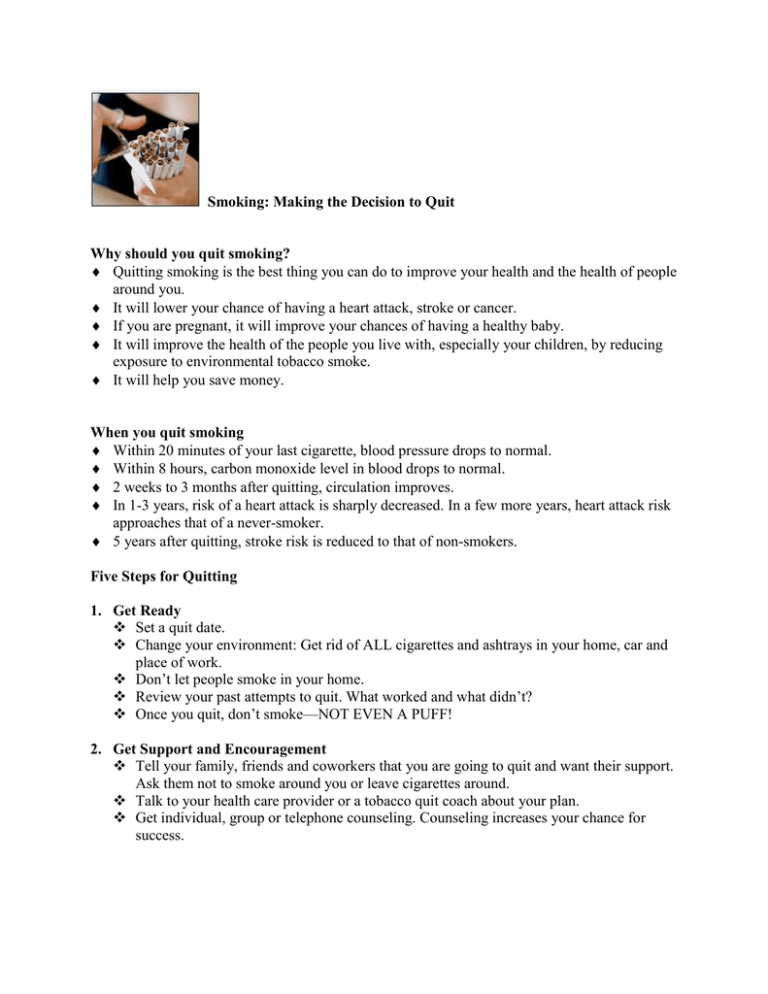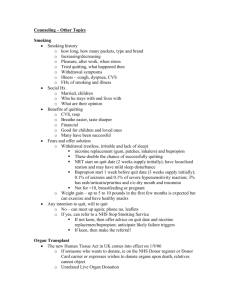Smoking: Making the Decision to Quit Why should you quit smoking?
advertisement

Smoking: Making the Decision to Quit Why should you quit smoking? Quitting smoking is the best thing you can do to improve your health and the health of people around you. It will lower your chance of having a heart attack, stroke or cancer. If you are pregnant, it will improve your chances of having a healthy baby. It will improve the health of the people you live with, especially your children, by reducing exposure to environmental tobacco smoke. It will help you save money. When you quit smoking Within 20 minutes of your last cigarette, blood pressure drops to normal. Within 8 hours, carbon monoxide level in blood drops to normal. 2 weeks to 3 months after quitting, circulation improves. In 1-3 years, risk of a heart attack is sharply decreased. In a few more years, heart attack risk approaches that of a never-smoker. 5 years after quitting, stroke risk is reduced to that of non-smokers. Five Steps for Quitting 1. Get Ready Set a quit date. Change your environment: Get rid of ALL cigarettes and ashtrays in your home, car and place of work. Don’t let people smoke in your home. Review your past attempts to quit. What worked and what didn’t? Once you quit, don’t smoke—NOT EVEN A PUFF! 2. Get Support and Encouragement Tell your family, friends and coworkers that you are going to quit and want their support. Ask them not to smoke around you or leave cigarettes around. Talk to your health care provider or a tobacco quit coach about your plan. Get individual, group or telephone counseling. Counseling increases your chance for success. 3. Learn New Skills and Behaviors Distract yourself from urges to smoke. Talk to someone, get busy with a task. Do something to reduce your stress. Exercise, read a book, practice deep breathing. Drink lots of water. If you have an urge, delay having the cigarette. 4. Get Medication and Use It Correctly There are 7 medications approved to help you quit smoking: Nicotine patch (available over the counter—OTC) Nicotine gum (available OTC) Nicotine lozenge (available OTC) Nicotine inhaler (by prescription—Rx—only) Nicotine nasal spray (by Rx only) Zyban (by Rx only). Also known by trade names Wellbutrin or Zyban. Varenicline (by Rx only). Also known as Chantix. Carefully read the information on the package. Using a medication with counseling will double your chances of successfully quitting. If you are pregnant, nursing, under age 18, or have a medical condition, talk to your health care provider before using any medication. 5. Be Prepared for Relapse or Difficult Situations Most relapses occur soon after quitting. Don’t be discouraged if you start smoking again. Most people try several times before they finally quit. Here are some difficult situations to watch for: Alcohol: Drinking alcohol lowers your chances of successful quitting. Other smokers: Being around other smoking can make you want to smoke. You may need to avoid smokers for awhile. Weight gain: Many people will gain some weight when they quit. Eat a healthy diet, stay active. Don’t let weight gain distract you from your main goal of quitting smoking. Use of nicotine gum or bupropion (Wellbutrin, Zyban) may delay weight gain. Bad mood or depression: Smoking affects our moods. If you find that your mood changes for the worse as you cut down or quit smoking, seek professional assistance in learning how to manage your mood without smoking. For more information: Visit www.trytostop.org Call the Massachusetts Smokers Helpline at 1-800-Try-To-Stop (1-800-879-8678) Spanish language Smokers Helpline: 1-800-8-Dejalo (1-800-833-5256) Deaf/Hard of Hearing: 1-800-TDD-1477 (1-800-833-1477) Recorded Quit Tips in English and Spanish: 1-800-Get-A-Tip (1-800-943-8284) It’s all FREE! Adapted from US Department of Health and Human Services Public Health Service “You Can Quit Smoking”, October 2000

